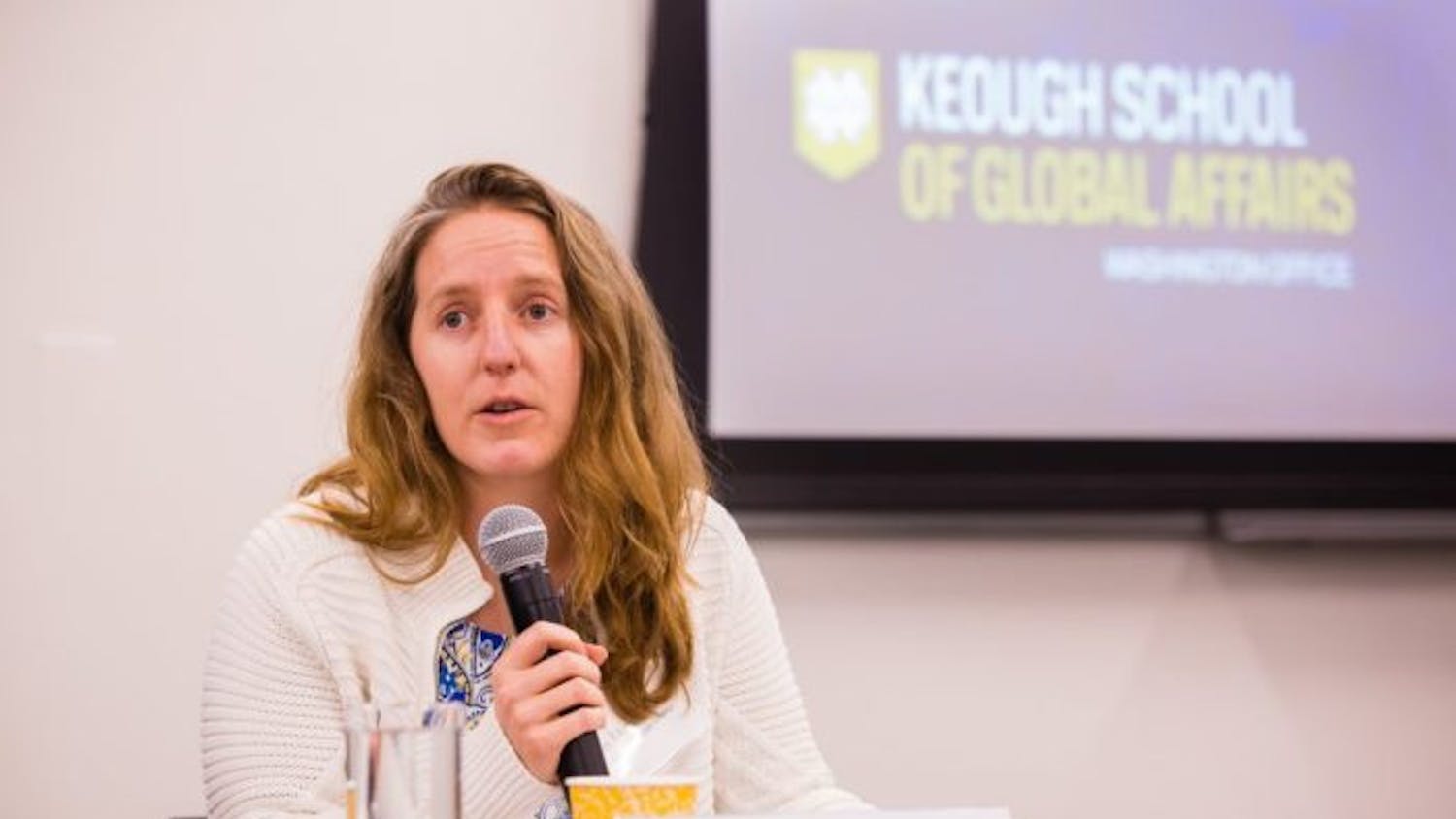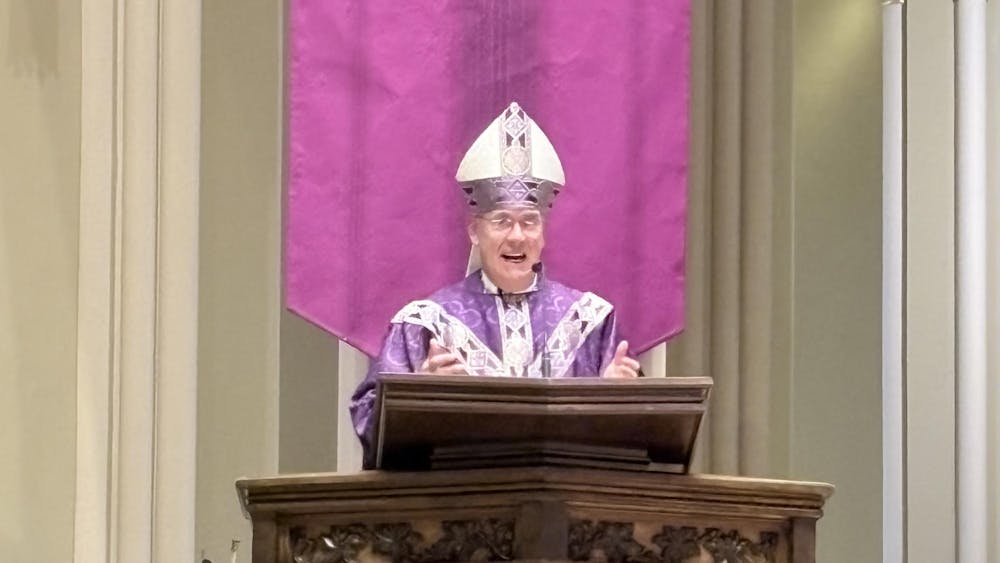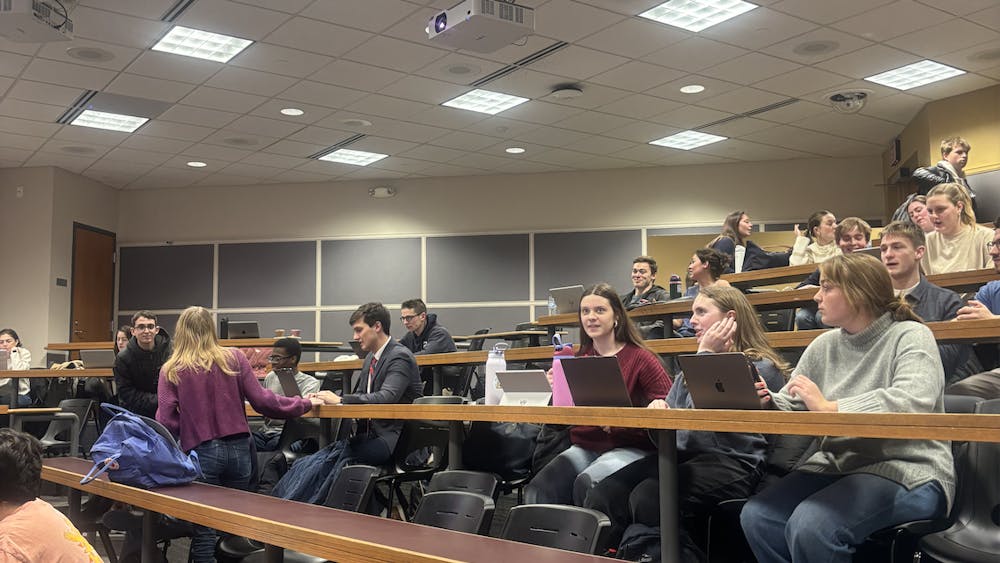The U.S. Senate voted 52-48 to confirm Judge Amy Coney Barrett as an associate justice on the Supreme Court Monday evening, finalizing one of the quickest confirmation processes in Supreme Court history as Republicans rushed to complete her appointment just eight days before the general election. She can begin work Tuesday.
The confirmation advanced to the Senate floor after passing in the Judiciary Committee 12-0 Thursday, when all 12 Republicans on the committee voted to advance the nomination and all 10 Democrats boycotted the vote.
Barrett, a Notre Dame law professor and circuit judge on the U.S. Court of Appeals for the 7th Circuit, will occupy the seat left vacant by the death of the late Justice Ruth Bader Ginsburg last month.
Barrett will shift the court to what many believe will be a 6-3 conservative majority, as most judicial observers believed Ginsburg to be the leader of the court’s liberal wing. At 48 years old, Barrett is the youngest justice on the bench, and her lifelong appointment will likely influence rulings for decades to come.
University President Fr. John Jenkins congratulated Barrett on the confirmation on behalf of Notre Dame.
“Recognized by experts from across the spectrum of judicial philosophies as a superb legal scholar and judge, she is an esteemed colleague and a teacher revered by her students,“ Jenkins said. “Justice Barrett becomes the first alumna of Notre Dame Law School and the first Notre Dame faculty member to be so honored.“
Barrett currently lives in South Bend, Ind., and commutes to Chicago for her judgeship. A native of New Orleans, La., Barrett earned her undergraduate degree at Rhodes College before graduating top of her class at Notre Dame. She has taught at the University since 2002 and currently teaches one class titled “Statutory Interpretations,” a seminar-style course.
Third-year Notre Dame Law student Brandon Winchel described Barrett as a fair-minded professor and the course as conversational.
“[Judge Barrett] wants to hear different perspectives about what people thought about the papers, what things they like, what things they disagreed with, and [she] just tries to foster discussion and moderates great conversation between all the classmates,” Winchel said.
Winchel said before the final Senate vote that confirmation would be “incredible for Judge Barrett as an alumnus of Notre Dame.” All eight current justices graduated from Yale or Harvard Law School.
“I think Judge Barrett’s confirmation to the court would go a long way towards showing the world that you don't have to graduate from an Ivy League school to be successful or intelligent,” Winchel said.
The confirmation hearing in front of a split Judiciary Committee
Personal political agenda and Barrett’s Catholic faith were repeated concerns voiced by Democrat members in her four-day confirmation hearing process before the Senate Judiciary Committee.Committee chairman Lindsey Graham said Barrett was one of the most qualified people to be a justice on the Supreme Court.
“She will faithfully apply the law to the facts without personal agenda and fully understands the difference between an impartial judge and a political activist,” Graham said in a statement.
On Oct. 12, the first day of Barrett’s confirmation hearing, each senator on the 22-person committee received 10 minutes to give an opening statement.
Graham, a South Carolina Senator, began by addressing the controversy of the nomination of a justice to the high court in an election year when some voting has already occurred, saying the “Senate is doing its duty constitutionally.”
“What will happen is my Democratic colleagues will say ‘This has never been done,’ and they’re right in this regard. Nobody, I think, has ever been confirmed in an election year past July,” Graham said. “There is nothing unconstitutional about this process.”
The controversy comes after former President Barack Obama nominated Judge Merrick Garland to the Supreme Court in early 2016 after Justice Antonin Scalia died, and Senate majority leader Mitch McConnell imposed a blockade prior to that year’s presidential election.
“The American people should have a voice in the selection of their next Supreme Court Justice,” McConnell said hours after Scalia’s death. “Therefore, this vacancy should not be filled until we have a new president.”
A large focus of the first day was on Barrett’s stance on the Affordable Care Act (ACA), which provides health insurance to millions of Americans with preexisting health conditions. Oral argument for Texas v. California is scheduled in the Supreme Court for Tuesday, Nov. 10 and will challenge the constitutionality of the ACA.
“Most importantly, healthcare coverage for millions of Americans is at stake with this nomination,” California Senator Dianne Feinstein said. “So, over the course of these hearings, my colleagues and I will focus on that subject.”
Barrett responds to questioning on Catholicism, race and reproductive rights
The second day of Barrett’s confirmation hearing, Oct. 13, featured public questioning by the Senate Judiciary Committee. Each senator had 30 minutes to question Barrett.The committee members worked to clarify the judge’s stances on various issues, including reproductive rights and race while questioning how Barrett’s religious views would factor into her decision making.
Barrett was questioned about her views on Roe v. Wade throughout the hearing. When prompted, the judge told California Senator Dianne Feinstein it would be inappropriate to comment on the precedent set by Roe or other cases like Planned Parenthood v. Casey, which established a standard of review for abortion laws.
“I don’t have any agenda,” Barrett said during the hearing. “I have no agenda to try to overrule Casey.”
Illinois Senator Dick Durbin asked Barrett if she had seen the video of George Floyd being killed by a police officer and how it made her feel.
“As you might imagine, given that I have two Black children, that was very, very personal for my family,” Barrett said.
She continued, saying it started difficult conversations with her children, and she and one of her daughters from Haiti “wept” together.
Barrett told the Committee she and her husband discussed what her nomination would mean in terms of her family life.
“We knew that our lives would be combed over for any negative detail. We knew that our faith would be caricatured; we knew that our family would be attacked,” Barrett said. “We had to decide whether those difficulties would be worth it because what sane person would go through that if there wasn’t a benefit on the other side?”
The judge acknowledged the role Catholicism plays in her life, but she assured South Carolina Senator Lindsey Graham that it would not affect her decision making in the court.
“I have a life brimming with people who have made different choices, and I have never tried, in my personal life, to impose my choices on them,” she said. “The same is true professionally.”
Texas Senator John Cornyn asked Barrett if she could share her preparatory notes with the room. The judge held up a notepad, blank save for the Senate letterhead.
Cornyn called the move “impressive,” while the internet ran to make a meme out of the moment.
Barrett's questioning continued on day three of the hearing, Oct. 14, including questions on her originalist philosophy, a method that interprets the Constitution how it was written when ratified. Barrett has compared her judicial philosophy to the late Justice Scalia, who Barrett clerked for after graduating from Notre Dame.
Delaware Senator Chris Coons said he thinks the American people need to better understand what that means in their everyday lives. He suggested that originalism could revert modern understanding of liberty and freedoms back to eighteenth and nineteenth century understandings.
Coons asked Barrett if she agrees with Scalia who believed that Griswold v. Connecticut, a landmark case affirming that a state cannot make the use of contraceptives illegal, was not right.
Barrett responded that she cannot express a view with respect to precedent.
“I think that Griswold is very, very, very, very, very, very unlikely to go anywhere,” Barrett said. “In order for it to go anywhere, you or another court would have to pass a law saying that birth control is illegal.”
Griswold set a foundation for other cases pertaining to rights to privacy, including Eisenstadt v. Baird, Roe v. Wade and Lawrence v. Texas, among others.
Barrett asserted she would determine her own position, despite what Scalia supported during his time on the bench.
“Everything that he said is not necessarily what I would agree with or do if I was Justice Barrett, that was Justice Scalia,” Barrett said. “I share [Scalia’s] philosophy, but I have never said that I would always reach the same outcome as he did.”
Missouri Senator Josh Hawley claimed some committee members were taking the “worst readings and most draconian misinterpretations of Justice Scalia” and attributing them to Barrett.
Hawley then asked Barrett if it was fair to say she is a different person than Justice Scalia, and she has — in her own words — her own mind, which Barrett affirmed.
After her affirmation of the statement, Hawley told Barrett he hopes the Committee can put aside these “demeaning and insulting” attempts.
“Put to rest this attempt to constantly leverage the worst interpretations of Justice Scalia’s philosophy misrepresentations and attribute them all to [Barrett] as if [she is] the same person,” Hawley said.
Groups, individuals speak on Barrett
Day four of Barrett’s hearings saw Republicans pushing to schedule a panel vote on her nomination for Oct. 22 and testimonies from outside speakers. Barrett was not present.Members from the American Bar Association (ABA) said they had determined Barrett is “well-qualified” to join the Supreme Court. Randall D. Noel, the chairman of the ABA committee, said their rating speaks to the thoughts of those in the field who know her best.
“The standing committee concluded that Judge Barrett’s integrity, judicial temperament, professional competence met the very high standards for appointment to our Supreme Court,” Noel said.
Crystal Good, an abortion-rights activist, virtually testified, saying Barrett’s nomination could lead to decreased access to abortions. At 16, Good was granted a special court order to receive an abortion without parental consent after her stepfather assaulted and impregnated her.
Good said she was only able to become the person she is today because she had access to an abortion. She fears this nomination will change things for people in the future.
“President Trump has been clear that he would appoint justices who would overturn Roe v. Wade,” Good said. “Unfortunately, through learning about Judge Barrett’s record, I understand why the President believes she passes that test.”
Laura Wolk, a 2016 graduate from Notre Dame Law, testified on the behalf of her former professor. Wolk is the first blind woman to clerk on the Supreme Court.
Wolk struggled when she first arrived at the University, worrying she would fail classes while struggling to establish friendships and a routine that worked for her.
She confided in Barrett, to which the judge responded: “Laura, this is no longer your problem. It’s my problem.”
After that conversation, Wolk said she was able to get the technology she needed that made it possible for her to succeed not only in law school, but also in her professional life.
“Those who have had the benefit of knowing Amy Coney Barrett understand that she possesses a boundless font of energy and a radical sense of love that she is ever ready to pour out,” Wolk said. “Judge Barrett will serve this country with distinction.”
Editor's note: Maria Leontaras contributed to this report.









